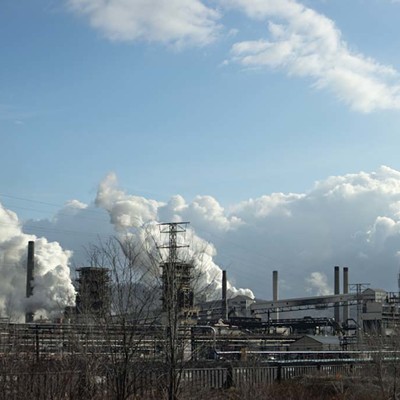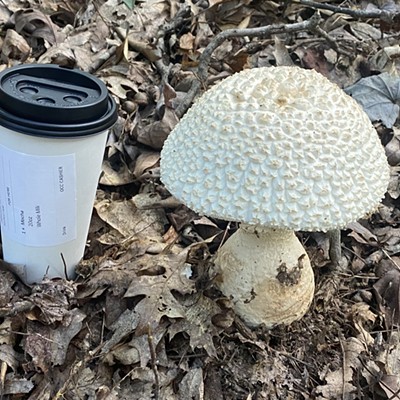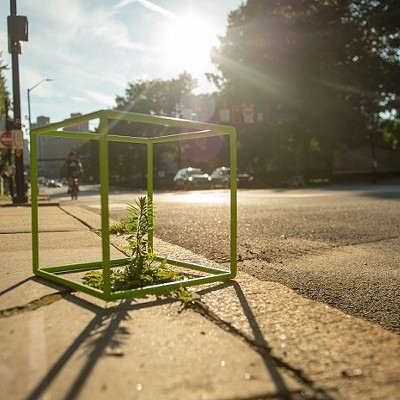This weekend the state Department of Conservation and Natural Resources co-hosts "Prowl the Sproul," an annual hiking weekend in Sproul and Susquehannock state forests, north of State College. A press release quotes DCNR Secretary Richard Allan touting "some of the most scenic hiking areas in the state."
But the Sproul and neighboring lands are less scenic than they were a couple of years ago. Thank an incursion of Marcellus Shale gas-drilling operations, each with well pad, access roads, pits of drilling waste, pipelines and truck traffic.
Curt Ashenfelter heads the Keystone Trails Association, a Harrisburg-based, 1,100-member group co-organizing the Prowl. He says that some Prowl hikes are routed to avoid wells -- while others are designed so hikers would see wells' impact.
"Until you're on site, you don't understand the scale of it," says Ashenfelter. "It's a five-acre industrial site in the middle of the woods."
Such itinerary changes begin to suggest how the Marcellus boom affects forestland: Beyond the risk of well blowouts and contaminated water, drilling disturbs the land, reduces tree cover and fragments animal habitats. And every patch of felled trees, every pipeline and new road compromises the forest's ability to control flooding, purify water and sequester carbon dioxide, says Philadelphia-based environmental consultant Robert Silverman.
Between 1947 and 2007, about 1,440 gas or oil wells were drilled on state land. According to a DCNR estimate, Marcellus drilling could mean 1,000 new wellpads and 10,000 wells on state forestland in the next decade or two, up from 150 wellpads now. (One pad can accommodate multiple wells.)
Mike Domach feels the effects already. For a decade, the Carnegie Mellon University chemical-engineering professor and self-described "redneck" has owned a camp near the 305,000-acre Sproul (the largest state forest). He hunts, fishes and hikes. But Domach has abandoned the stretch of State Route 144 running through the southern part of the forest.
Domach cites trucks carrying the millions of gallons of fresh water each shale-gas drilling site needs for the process called hydrofracturing … and then hauling the briny wastewater away. Route 144 "became treacherous," he says. "The water trucks tend to like the middle of the road." Meanwhile, though 144 is a state-designated Scenic Byway, he says, "all you see is holes punched in for gas wells and frack ponds."
Moreover, nearby State Gameland 100 "is basically fences, ponds, trailers and 24-hour illumination with big spotlights and security," Domach says.
Asked about such concerns, DCNR spokesperson Chris Novak says the department seeks to "balance" different uses of the forests, and relies on leasing provisions such as well spacing and setbacks from streams to minimize impact. And Game Commission spokesman Jerry Feaser contends that building wellpads can actually improve habitat for some species. The clearings encourage sun-dependent plant species and the animals that feed on them, he says.
Leasing state lands means big money. Two lease sales since 2008 have earned $296 million for the state's Oil and Gas Fund. In April, the cash-strapped Game Commisison made $18 million from leasing.
Yet Marcellus drilling in Pennsylvania has only just begun. Last year, only about 250 acres of the nearly 700,000 acres of state forestland available for leasing had been "converted" for drilling. By 2016, the DCNR estimates, that figure will jump thirtyfold, to 7,531 acres. The total could reach 25,000 acres, including 6,000 in Sproul alone.
And that's under former Gov. Ed Rendell's 2010 moratorium on leasing additional forestland. The moratorium followed a DCNR report that concluded, on environmental-quality grounds, "There are zero [additional] State Forest Land acres suitable for gas leasing involving surface disturbance."
Drilling, Rendell said, could also harm the state's $5.5 billion forest-products industry, which relies partly on sustainability certification by the Forest Stewardship Council.
But Gov. Tom Corbett -- whose campaign accepted more than $1 million from oil and gas interests -- plans to lift the moratorium. That would double the acreage available for leasing.
Drilling seems poised to grow both on public lands where subsurface mineral rights are mostly publicly owned (like state forests) and where they're mostly privately owned, like state parks and even Allegheny National Forest.
"The whole state is going to be industrialized," says Cathy Pedler, Forest Watch Coordinator for environmental group Allegheny Defense Project. "And we can't even protect our public land."














